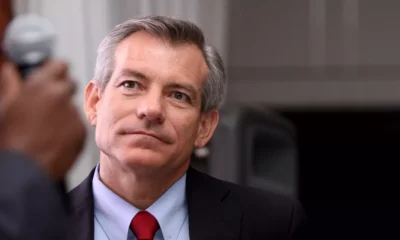Business
Trump’s 100% Tariff Threat Shakes Up Foreign Film Industry

NEW YORK — President Donald Trump has reignited his tariff war, this time focusing on films produced outside the United States.
In a post Sunday night on his Truth Social platform, Trump announced that he has authorized the Department of Commerce and the Office of the U.S. Trade Representative to impose a 100% tariff on all foreign films entering the country.
He expressed concern that the American movie industry is “DYING” and attributed this decline to other nations offering incentives to filmmakers, claiming it poses a national security threat and amounts to propaganda.
Implementation of such a tariff remains unclear. Major films often shoot in multiple countries, complicating enforcement. For example, high-budget productions like the upcoming “Mission: Impossible – The Final Reckoning” utilize international locations.
Incentive programs have long influenced filming locations, leading to a shift from California to countries and states with favorable tax incentives, such as Canada and the UK.
While tariffs aim to encourage U.S. consumption of domestic products, American films dominate the box office. Recent data shows that U.S. movies generated $22.6 billion in exports in 2023, contributing significantly to the economy.
Trump has been consistent in his protectionist policies, having already imposed significant tariffs on goods from various countries. He maintains that foreign film production undermines U.S. cinema.
Concerns about foreign production have been prevalent since before Trump took office. He previously enlisted celebrities like Mel Gibson and Jon Voight as ambassadors to bolster Hollywood’s domestic output.
The U.S. film industry faces challenges, including the aftermath of the COVID-19 pandemic, 2023’s Hollywood guild strikes, and devastating wildfires in Los Angeles. Production dropped 26% last year compared to 2021, with locations outside the U.S. increasingly favored for filming.
Recent surveys indicate that no U.S. locations made the top five preferred filming spots, with cities such as Toronto and Vancouver leading the pack. California’s film production has particularly suffered, with a 5.6% decline last year.
In response to dwindling numbers, California Governor Gavin Newsom proposed enhancing the state’s Film & Television Tax Credit program, suggesting an increase to $750 million annually.
Other U.S. cities, including Atlanta and New York, are also utilizing aggressive tax breaks to attract film projects. These can include cash grants and tax credits, implemented successfully in states like Texas and New Mexico.
“Other nations have been stealing the movie-making capabilities from the United States,” Trump stated after returning from Florida. He emphasized the need for tariffs on films not produced domestically.
Associated Press writer Gary Field contributed to this report from Washington.


















